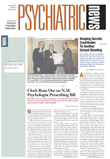With a new president installed at its recent annual meeting, the American Association for Geriatric Psychiatry (AAGP) has primed itself to use its newly established image and influence to advocate strongly for increased mental health services for the nation’s elderly, combating what it sees as the greatest health challenge of the new millennium.
A year ago, then incoming president William E. Reichman, M.D., an associate professor of psychiatry at the University of Medicine and Dentistry of New Jersey, had lofty goals for his year as president of the association of nearly 2,000 geriatric psychiatrists. He challenged an organization he likened to an “adolescent struggling to grow up” to bring greater visibility to the field of geriatric psychiatry and to establish AAGP’s voice as the authority on geriatric mental health. “Over this past year, geriatric psychiatry, with the AAGP as its voice, rose to the challenge and accomplished its goal with thrilling results,” Reichman told those attending the group’s annual meeting in San Francisco last month.
The AAGP waged an all-out public relations campaign over the last year that resulted in articles featuring geriatric psychiatry and focusing on mental health issues in the elderly in several large newspapers, including the New York Times, New York Daily News, Washington Post, Miami Herald, Los Angeles Times, and USA Today.
In addition, several of the AAGP’s prominent figures did broadcast interviews with media outlets including National Public Radio and NBC’s “Today Show.”
“This last year,” Reichman said, “our profession passed a threshold of visibility and public recognition from which we should never turn back. We were able to consistently and dramatically voice the AAGP’s concerns where it really matters.”
Through the AAGP’s Public Policy Committee, chaired by Joel E. Streim, M.D., an associate professor of psychiatry and senior fellow at the University of Pennsylvania Institute on Aging, the AAGP met early in the year with the presidential campaign of Vice President Al Gore and more recently made a presentation to the new Bush administration’s acting director of the Health Care Financing Administration and senior Medicare officials on AAGP’s most significant Medicare reimbursement concerns.
“The AAGP spoke precisely and critically of widespread idiosyncrasies in reimbursement policy among regional administrators, reimbursement practices that serve as real and significant barriers to accessing needed geriatric mental health care,” Reichman said.
The AAGP also held its first consensus conference on mental health services in nursing homes, bringing together psychiatrists and mental health professionals from a wide variety of disciplines to establish itself as the leader in the geriatric mental health community.
“I am convinced,” Reichman declared, “that our AAGP has never been more vital to the public health of this nation’s seniors.”
Reichman introduced the AAGP’s incoming president, Stephen J. Bartels, M.D., M.S., an associate professor of psychiatry at Dartmouth Medical School and director of Aging Services Research at the New Hampshire-Dartmouth Psychiatric Research Center. Bartels maintains a practice in geriatric psychiatry, specializing in geriatric community mental health services research, and serves as medical director of the Division of Behavioral Health for the state of New Hampshire. Bartels is also well known within APA, serving as the AAGP representative for both APA’s Council on Aging and the Jack Weinberg Memorial Award for Geriatric Psychiatry.
“Our goal,” Bartels said in his presidential address, “is to take stock of where we are as a nation in recognizing and meeting the needs of older Americans with mental health disorders and particularly to evaluate our readiness to meet the future challenges of the coming decades.
“We will consider the possibility,” Bartels continued, “that mental disorders associated with aging constitute one of the greatest public health challenges and potential new health care crises of the new millennium.”
Bartels based his contention of crisis on four main points, he said. First, there has been a dramatic increase in the number of older Americans with mental disorders, which is projected to continue to increase as the elderly population increases with the aging of the baby-boom generation.
Second, this increase has a major direct and indirect impact on the utilization and cost of health services. Third, treatments for mental health disorders are proven to work, but there is a major gap between mental health services needs, service infrastructure, and expenditures. And fourth, there is an alarming underinvestment in knowledge dissemination, service development, and research to meet the needs of the future.
“Mental disorders in older persons really constitute a silent epidemic. Alzheimer’s disease and other memory disorders are epidemic. Depression and anxiety disorders, severe mental illness, and alcohol abuse have all been underassessed, but are thought to be highly prevalent in older persons. And suicide is highest in older persons aged 75 and above,” Bartels said.
But the costs of mental illness in the elderly is mostly borne by primary care, not psychiatry, Bartels explained. While studies indicate that mental disorders affect at least 30 percent of the elderly population, they often go undiagnosed.
Comorbidity, Bartels thinks, plays a major role. For example, depression is highly comorbid with medical illnesses, such as hypertension and other forms of heart disease, arthritis, and ulcers, he pointed out.
“These individuals,” Bartels said, “are in fact coming in and asking for and receiving increased medical contact that is costing the health care system more money, and yet it is underrecognized as treating mental illness.
The problem, according to Bartels, is that from 1990 to 2000 Medicare spending for mental disorders has remained relatively even at 4.4 percent.
The agenda for the coming year, as well as beyond, Bartels told the group, will be to convince those who hold the purse strings of the great enormity of this public health concern.
“The challenge to us as an organization,” Bartels concluded, “is how we are going to steer the field to meet these dramatically increasing needs over the next century.”
More information on the AAGP and its activities and resources is posted on the association’s newly designed Web site, www.aagponline.org. ▪


